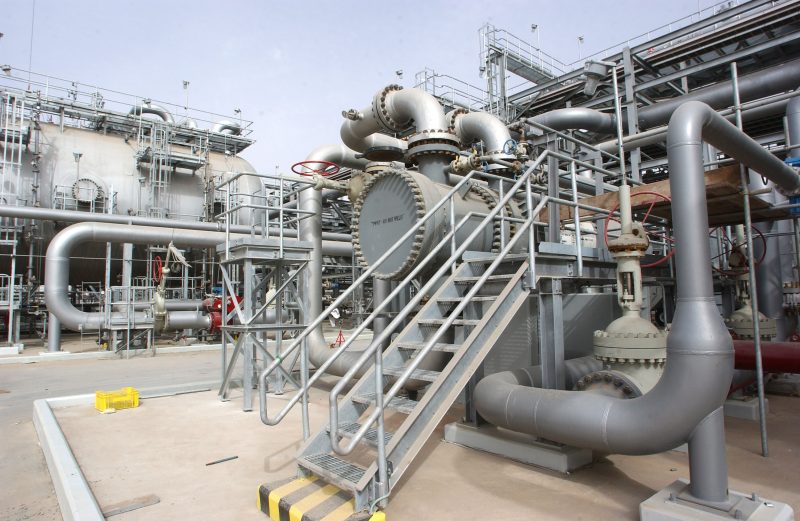OPEC extends oil output cuts after Moscow-Riyadh pact
OPEC and its oil-producer allies decided in December to trim daily crude output by 1.2 million barrels ()
Vienna (AFP) – OPEC agreed Monday to extend by nine months daily oil output cuts aimed at supporting prices and soaking up excess supplies, following last weekend’s G20 pact between cartel kingpin Saudi Arabia and non-member Russia.
“We are very happy to announce that we have reached an agreement to extend for nine months the current production level,” said OPEC president and Venezuelan Oil Minister Manuel Quevedo at the group’s plush Vienna headquarters.
The expected news followed an official ministerial output meeting of the 14-nation Organization of the Petroleum Exporting Countries (OPEC), which pumps just under one third of the world’s oil.
Members will gather again on Tuesday for OPEC+ — a grouping that comprises a total of 24 crude producers including Russia, Kazakhstan, Malaysia and Mexico — which is also expected to extend its collective production limits.
The enlarged crude producing club had already decided in December to remove 1.2 million barrels per day from the market in a deal which ran through to the end of June.
The original cutbacks, sparked after oil prices tanked at the end of last year on fears of slower global growth, sent the market surging by a third in the first three months of this year.
The news nevertheless sent oil prices rallying on Monday, with sentiment boosted also by the China-US trade truce that was agreed at the G20 in Osaka.
New York crude gained 62 cents to finish at $59.09 per barrel, while Brent oil added 32 cents to $65.06.
– Permanent cooperation charter –
“The G20 put a very nice backdrop to where we are today,” said Saudi Arabia’s Energy Minister Khalid al-Falih at a press conference announcing the extension.
“The global economy looks a lot better than it did a couple of years ago because of the agreement reached between President (Donald) Trump and China.”
However, this week’s OPEC action was largely overshadowed after Russian President Vladimir Putin and Saudi Arabia agreed Saturday on the sidelines of the G20 to extend the deal by between six and nine months, leaving only the time frame unclear.
The cartel’s ministers also agreed on Monday to establish a formal and permanent “charter of cooperation” between OPEC and non-OPEC nations, despite reservations from Iran.
Falih said that Saudi Crown Prince Mohammed bin Salman and Russian President Vladimir Putin had met and “enthusiastically supported an extension for up to nine months”.
“There was no doubt in their minds that this (OPEC+) framework… has been extremely beneficial to producers as well as consumers, and of course to the global economy,” Falih said.
“They also gave us their support to (Russian Energy Minister Alexander) Novak and myself that they would welcome making this cooperation… a permanent framework that would always bring producers from both sides together.”
Novak had declared earlier Monday that “everyone” supported the proposition to extend production caps.
The OPEC+ grouping, formed three years ago to combat slumping prices in the face of abundant supplies, together accounts for almost half of global crude.
Iran had earlier slammed the Osaka move, arguing that OPEC did not simply exist to rubber-stamp a decision made outside of the cartel, but did nevertheless support the extension.
The Islamic republic, with production severely hit by US sanctions, is however exempt from the December cuts agreement along with crisis-stricken pair Venezuela and Libya.
– Reports of OPEC death ‘exaggerated’ –
Falih was meanwhile swift to deflect criticism from Saudi Arabia’s archfoe Iran that OPEC could “die” in the face of Riyadh and Moscow’s deal.
“As Mark Twain said once, the reports of OPEC’s death have been repeated many times, and every time it was … greatly exaggerated,” Falih told reporters earlier in the day.
Monday’s meeting also followed an agreement between Trump and his Chinese counterpart Xi Jinping on the sidelines of the G20 to restart trade talks, reviving hopes of an end to their tariff war which has dented the outlook for energy demand and the global economy generally.
The cartel meanwhile remains on red alert over escalating US-Iran tensions that have also fuelled strong oil-price gains, particularly over disputed attacks on tankers in the Straits of Hormuz — a vital passage for world oil supplies.
Yet global demand worries persist and the cartel has also lost considerable market share to the US, whose booming shale output has transformed it into the world’s biggest oil producer ahead of Saudi Arabia.
Disclaimer: Validity of the above story is for 7 Days from original date of publishing. Source: AFP.


